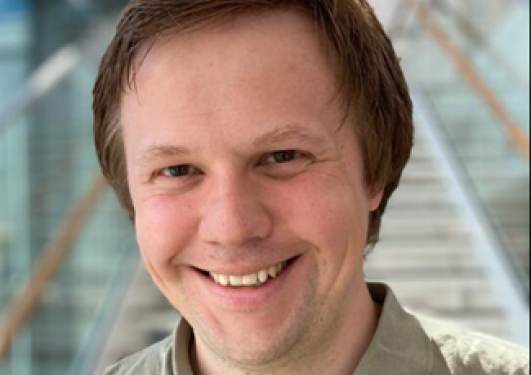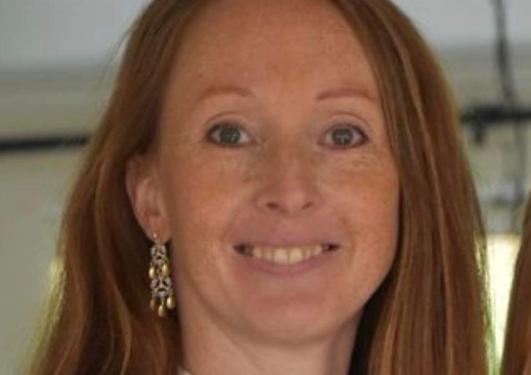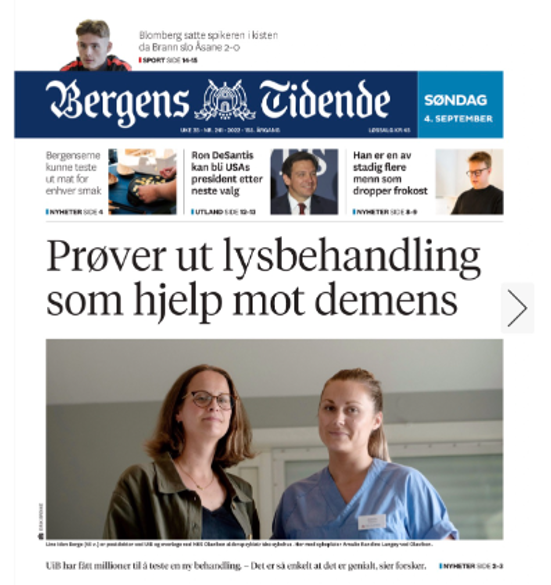The DARK-DEM study
A randomized controlled trial to test if virtual darkness can alleviate agitation in people with dementia.

Main content
Behavioural and psychological symptoms of dementia (BPSD) describe changes in behaviour and mental state caused by the dementia syndrome, and encompasses amongst others anxiety, depression, psychosis and agitation. These symptoms are prevalent in persons with dementia, often treatment-resistant, resource-demanding and contribute to worsening of cognition, independency, reduced quality of life and increased mortality.
The “gold standard” for assessment is retrospective proxy rating with psychometric scales, yet the low test-retest reliability challenges evaluations over time. This barrier can be overcome by “digital phenotyping”, that is, the characterisation of human behaviour by moment-by-moment monitoring with personal digital devices. Moreover, in dementia, circadian rhythms become less robust, which potentiates BPSD. As such, chronotherapy, i.e., interventions targeting the circadian rhythm, is promising. Intrinsically photosensitive retinal ganglion cells (ipRGC) monitor the perception of day and night and are maximally sensitive to light with short wavelengths. This discovery paved the way for virtual darkness therapy, that is, solely exposure to light deprived of blue wavelengths in the evening and night. Lastly, when the new procedures and interventions are applied in health institutions for people with dementia, successful implementation is dependent on knowing the complexity of contextual factors affecting it.
The aim of DARK.DEM is to develop and evaluate digital phenotyping and virtual darkness therapy to enhance BPSD management in specialized dementia care and facilitate implementation in municipal dementia care.
Methods: From Artificial intelligence and virtual darkness to hermeneutics
In the first part of the project, we will use artificial intelligence to examine whether data from smart watches can provide accurate measures of agitation, depression and sleep disturbances in persons with dementia admitted to NKS Olaviken Gerontopsychiatric Hospital. In the second part of the project, we will conduct a randomized controlled trial to determine whether treatment with virtual darkness, that is, light without blue wavelengths, can alleviate agitation and other BPSD among inpatients at the hospital. This treatment had striking effect in reducing manic symptoms in persons with bipolar disorders in a recent trial, and in addition, it reduced the need for psychotropic drugs and shortened the hospital stay. In the final part of the project, we will conduct focus group interviews with staff at the hospital and in nursing homes in Bergen to explore barriers and enablers for implementation of the new methods in municipal dementia care.
Technology used in the project
- Empatica embrace wristband measuring movement, heart rate variability, skin temperature and oxygen saturation
- Circadian light delivered by Chromaviso
Societal impact
This project will enhance diagnostics and treatment of behavioural and psychological symptoms of dementia in both specialized and municipal dementia care.
Status
The study was initiated in august 2023, and we have recruited two PhD candidates, one postdoc and a research nurse. We have applied for REK approval, developed a Data Protection Impact Assessment (DPIA), registered the trial in the proper channels (clinicaltrial.gov, helsenorge.no, RETTE and christin.no) and developed information materials for staff, patients and caregivers. The 9th of September 2024 we had a kick-off with the staff at the hospital. We are currently recruiting participants, the procedures including the virtual darkness therapy is perceived well by both the staff and the patients. We aim to include 72 patients by the end of 2026.


Tone Elise Gjøtterud Henriksen

Stein Erik Fæø

